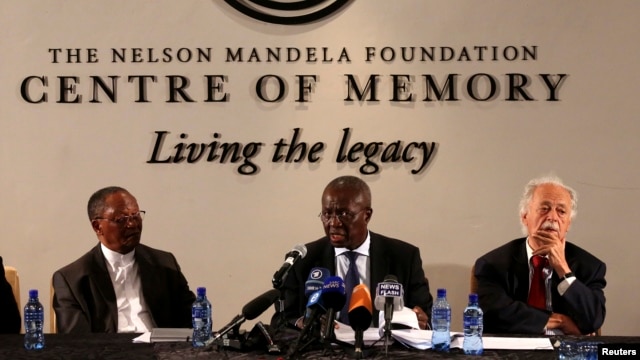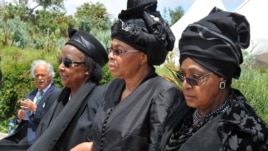Deputy
Chief Justice Dikgang Moseneke (C) reads Mandela's will as he is
flanked by Professor Njabulo Ndebele (L) and Advocate George Bizos,
Nelson Mandela's lawyer, confidant and friend at the Nelson Mandela
Center of Memory in Houghton,
JOHANNESBURG — Mandela’s will is more
than a dry account of who gets what. The 40-page document he wrote in
2004 reflects that he was a meticulous and generous man.
Executors for Mandela’s estate, which they valued at $4.1 million, say the assets will mostly go to his family from his three marriages. He also made bequests to the African National Congress party, former staff members and schools.
One of the will’s executors, South Africa’s Deputy Chief Justice Dikgang Moseneke, said the will is long.
“I think you will find it quite an interesting read. Because quite often he expresses why he makes virtually every bequest, so it is part of the reason it would run to so many pages," he explained, "because he tries to have a rational ground for making the bequest, a rational and emotional ground, but nonetheless an explained one.”
Moseneke said he was not aware of any legal challenges to the will. Executors read the document to Mandela’s family before appearing before journalists. The large family, which has previously been embroiled in legal squabbles over the former president's wealth and wishes, left without speaking to reporters.
Last month, family members publicly squabbled over who will lead the family. Moseneke said the will does not address family power positioning.
The will states Mandela loaned each of his children about $300,000 before his death. The will releases them from that loan.
There is no mention in the document provided to journalists to Winnie Madikizela-Mandela, to whom he was married longest.
It is unclear what Mandela’s third wife, his widow Graca Machel, will end up receiving in the final settlement. Under community property law she could be entitled to half of his estate. Butt the will asks her to surrender her rights within 90 days for a list of items that was not given to journalists.
Personal chef Xoliswa Ndoyiya and eight other members of Mandela's staff received about $4,500.
“It gave me a shock of my life ... I got shocked that he has remembered me, that he can give me something,” she said, adding that the bequest was a complete surprise.
Mandela, who spoke often about the importance of education, left about $9,000 to every school he attended, plus two others in areas where he lived.
University of the Witwatersrand Vice Chancellor Adam Habib said his decision to leave money to an institution that discriminated against him as a student is telling.
“Well it is ironic," noted Habib, "I have been on record as saying that Wits apologizes for that. His experience at Wits was both positive and negative. It was positive, if you look at his biography, he says that it opened him up to ideas, but it was also negative in the sense that he was treated badly.
" And I do not think we should hide that," he added. " I think we should recognize that and we should learn the lessons from that. ... The will is quite clear that is for scholarships and for bursaries. And that is exactly what we will dedicate it to. We will dedicate it to addressing or contributing to addressing the challenge of inequality.”
One of Mandela’s oldest friends, lawyer George Bizos, who also served as an executor, said the document is a reflection of an extraordinary man.
“He gave reasons why he wanted to give to educational institutions, because he wanted people, disadvantaged throughout their lives, to really be treated in a way as human beings," he told reporters as he wiped tears from his face. "This was his credo, this is what he hoped for all of us.”
Executors for Mandela’s estate, which they valued at $4.1 million, say the assets will mostly go to his family from his three marriages. He also made bequests to the African National Congress party, former staff members and schools.
One of the will’s executors, South Africa’s Deputy Chief Justice Dikgang Moseneke, said the will is long.
“I think you will find it quite an interesting read. Because quite often he expresses why he makes virtually every bequest, so it is part of the reason it would run to so many pages," he explained, "because he tries to have a rational ground for making the bequest, a rational and emotional ground, but nonetheless an explained one.”
Moseneke said he was not aware of any legal challenges to the will. Executors read the document to Mandela’s family before appearing before journalists. The large family, which has previously been embroiled in legal squabbles over the former president's wealth and wishes, left without speaking to reporters.
Last month, family members publicly squabbled over who will lead the family. Moseneke said the will does not address family power positioning.
The will states Mandela loaned each of his children about $300,000 before his death. The will releases them from that loan.
There is no mention in the document provided to journalists to Winnie Madikizela-Mandela, to whom he was married longest.
It is unclear what Mandela’s third wife, his widow Graca Machel, will end up receiving in the final settlement. Under community property law she could be entitled to half of his estate. Butt the will asks her to surrender her rights within 90 days for a list of items that was not given to journalists.
Personal chef Xoliswa Ndoyiya and eight other members of Mandela's staff received about $4,500.
“It gave me a shock of my life ... I got shocked that he has remembered me, that he can give me something,” she said, adding that the bequest was a complete surprise.
Mandela, who spoke often about the importance of education, left about $9,000 to every school he attended, plus two others in areas where he lived.
University of the Witwatersrand Vice Chancellor Adam Habib said his decision to leave money to an institution that discriminated against him as a student is telling.
“Well it is ironic," noted Habib, "I have been on record as saying that Wits apologizes for that. His experience at Wits was both positive and negative. It was positive, if you look at his biography, he says that it opened him up to ideas, but it was also negative in the sense that he was treated badly.
" And I do not think we should hide that," he added. " I think we should recognize that and we should learn the lessons from that. ... The will is quite clear that is for scholarships and for bursaries. And that is exactly what we will dedicate it to. We will dedicate it to addressing or contributing to addressing the challenge of inequality.”
One of Mandela’s oldest friends, lawyer George Bizos, who also served as an executor, said the document is a reflection of an extraordinary man.
“He gave reasons why he wanted to give to educational institutions, because he wanted people, disadvantaged throughout their lives, to really be treated in a way as human beings," he told reporters as he wiped tears from his face. "This was his credo, this is what he hoped for all of us.”












0 comments:
Post a Comment